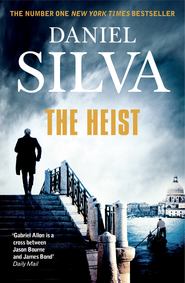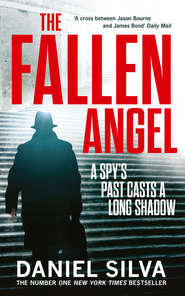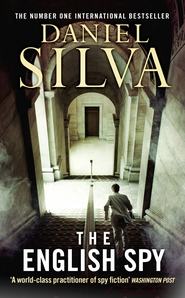По всем вопросам обращайтесь на: info@litportal.ru
(©) 2003-2024.
✖
Daniel Silva 2-Book Thriller Collection: Portrait of a Spy, The Fallen Angel
Настройки чтения
Размер шрифта
Высота строк
Поля
“And how would we do that?”
“We give them the money, Eli. We give them the money.”
There are two basic types of intelligence, Gabriel needlessly reminded his team. There is human intelligence, or “humint” in the jargon of the trade, and signals intelligence, also known as “sigint.” But the ability to track the flow of money in real time through the global banking system had given spies a powerful third form of intelligence gathering sometimes referred to as “finint,” or financial intelligence. For the most part, finint was highly reliable. Money didn’t lie; it simply went where it was told to go. What’s more, the electronic trail of intelligence left by its movements was predictive in nature. The Islamic terrorists had learned long ago how to deceive Western spy agencies with false chatter, but rarely did they invest precious financial resources in deception. Money usually went to real operatives who were engaged in real plots. Follow the money, said Gabriel, and it would illuminate the intentions of Rashid and Malik like the lights of an airport runway.
But how to go about doing it? That was the question Gabriel and his team wrestled over for the remainder of that long and sleepless night. A clever forgery? No, insisted Gabriel, the jihadist world was far too insular for that. If the team tried to create a wealthy Muslim benefactor out of whole cloth, the terrorists would plop him in front of a camera and saw off his head with a butter knife. The money would have to come from someone with unimpeachable jihadist credentials. Otherwise, the terrorists would never accept it. But where to find someone who straddled both sides of the divide? Someone who would be regarded by the jihadists as genuine and yet would still be willing to work on behalf of Israeli and American intelligence. Call the Old Man, Yaakov suggested. In all likelihood, he would have a name at the tip of his nicotine-stained fingers. And if he didn’t, he would surely know where to find one.
As it turned out, Shamron did have a name, which he murmured into Gabriel’s ear, via secure telephone, a few minutes after four a.m. Washington time. Shamron had been watching this person for many years. The approach would be fraught with risk for Gabriel, both personal and professional, but Shamron had in his file drawers a substantial amount of evidence to suggest it might be received in a positive manner. He took the idea to Uzi Navot, and within minutes, Navot signed off on it. And thus, with a stroke of Navot’s ludicrous gold pen, the return of Gabriel Allon, the wayward son of Israeli intelligence, was made complete.
The members of the Barak team had engaged in many profound arguments over the years, yet none would ever rival the one that took place within the walls of the house on N Street that morning in December. Chiara dismissed the idea as a dangerous flight of fancy; Dina called it a waste of precious time and resources that would surely come to nothing. Even Eli Lavon, Gabriel’s closest friend and ally, was glum about the prospects for success. “It will turn out to be our version of Rashid,” he said. “We’ll congratulate ourselves on our cleverness. Then, one day, it will blow up in our face.”
Much to everyone’s surprise, it was Sarah who came to Gabriel’s defense. Sarah knew Shamron’s candidate far better than the others, and Sarah believed in the power of redemption. “She’s not her father’s daughter,” Sarah said. “She’s different. She’s trying to change things.”
“That’s true,” said Dina, “but that doesn’t mean she would ever agree to work with us.”
“The worst thing she can do is say no.”
“Maybe,” said Lavon gloomily. “Or maybe the worst thing she can do is say yes.”
Chapter 19 Volta Park, Washington, D.C. (#ulink_9128bb4a-738c-54ba-8e34-5aceacefc57d)
GABRIEL WAITED UNTIL SUNRISE BEFORE phoning Adrian Carter. Carter was already on his way to Langley, the first stop of a brutally long day. It included a morning of closed-door testimony on Capitol Hill, a midday luncheon with a delegation of visiting spies from Poland, and, lastly, a counterterrorism strategy session in the White House Situation Room, chaired by none other than James McKenna. Shortly after six that evening, exhausted and dispirited, Carter alighted from his armored Escalade on Q Street and, in semidarkness, entered Volta Park. Gabriel waited on a bench near the tennis courts, coat collar up against the cold. Carter sat next to him. The armored SUV rumbled at idle in the street, discreet as a beached whale.
“Do you mind?” asked Carter, fishing his pipe and tobacco pouch from his coat pocket. “It’s been a rough afternoon.”
“McKenna?”
“Actually, the president decided to grace us with his presence, and I’m afraid he didn’t care for what I had to say.” Carter seemed to apply all his considerable powers of concentration to the task of loading his pipe. “I’ve had the privilege of being dressed down by four presidents during my service to this great country of ours. It’s still never a pleasant experience.”
“What’s the problem?”
“The NSA is picking up a great deal of chatter suggesting another attack might be imminent. The president demanded to know the precise details, including the location, timing, and the weapon involved. When I couldn’t answer, he became annoyed.” Carter ignited his pipe, briefly illuminating his drawn features. “Twelve hours ago, I might have been willing to dismiss the chatter as insignificant. But now that I know we’re up against Malik al-Zubair, I’m not so optimistic.”
“When counterterrorism officers feel optimism, innocent people usually end up dead.”
“Are you always so cheerful?”
“It’s been a long few days.”
“How sure is Dina that it’s really him?”
Gabriel recited the basic elements of her case: his failed attempt to secure Bin Laden’s backing, the meeting at Kemel Arwish’s apartment in Amman, and the unique design of Malik’s suicide belts. Carter demanded no more evidence. He had acted on far less in the past, and he had been expecting this for a long time. Malik was the type of terrorist Carter feared the most. Malik and Rashid working together was his worst nightmare come to life.
“For the record,” he said, “no one inside the CTC has made any connection yet between Rashid and Malik. Dina got there first.”
“She usually does.”
“So what does one do with such information when one is in my position? Does one give it to the analysts toiling in the bowels of the CTC? Does one tell his director and his president?”
“One keeps it to himself, lest one blow my operation to pieces.”
“What operation is that?”
Gabriel rose and led Carter across the park to a second bench overlooking the playground. Leaning close to Carter’s ear, he outlined the plan while a childless swing squeaked faintly in the gentle breeze.
“This smells like Ari Shamron to me.”
“With good reason.”
“What do you have in mind? An anonymous donation to the Islamic charity of your choice?”
“Actually, we were thinking about something a bit more targeted in nature.”
“A direct donation to Rashid’s coffers?”
“Something like that.”
Wind moved in the trees surrounding the playground, unleashing a downpour of leaves. Carter brushed one from his shoulder and said, “It will take too much time.”
“Patience is a virtue, Adrian.”
“Not in Washington. We like to do things in a hurry.”
“Do you have a better idea?”
With his heavy silence, Carter made clear he didn’t. “It’s interesting,” he conceded. “Better still, it’s devious as hell. If we can actually become the primary source of funding for Rashid’s network . . .”
“Then we would own them, Adrian.”
Carter rapped his pipe against the side of the bench and slowly reloaded the bowl. “Let’s not get carried away just yet. This conversation is totally moot unless you can convince a well-to-do Muslim with jihadist street cred to work with you.”
“I never said it would be easy.”
“But you obviously have a candidate in mind.”
Gabriel glanced toward the basketball court where a member of Carter’s security detail was pacing slowly.
“What’s wrong?” Carter asked. “You don’t trust me?”
“It’s not you, Adrian. It’s the eight hundred thousand other people in your intelligence community who have top-secret clearances.”
“We still know how to compartmentalize information.”
“Tell that to your friends and allies who allowed you to put black sites on their soil. I’m sure you promised them the program would remain secret. But it didn’t. In fact, it was splashed across the front page of the Washington Post.”
“Yes,” Carter said morosely, “I seem to remember reading something about that.”
“The person we have in mind comes from a country with close ties to yours. If it ever became known that this individual was working on our behalf . . .” Gabriel’s voice trailed off. “Let’s just say the damage would not be limited to an embarrassing newspaper story. People would die, Adrian.”











